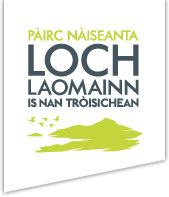
Youth Action at Loch Lomond & The Trossachs National Park
Alison Cush, our Education and Inclusion Adviser, tells us about the importance of providing young people with opportunities to contribute to solutions for climate change and nature conservation
Youth Action is central to our engagement efforts at Loch Lomond & The Trossachs National Park, empowering young people to connect with, learn about, and care for the wildlife and landscapes of the Park. Through these programmes, we also aim to showcase career pathways and build skills for those interested in environmental careers.
One of our key initiatives is the Junior Rangers programme, which invites young people aged 11 to 18 to actively participate in projects that contribute to the restoration of the Park’s natural landscapes. The programme includes a school’s component as well as a follow-on weekend programme for those who’re keen to continue their involvement.
In October, we welcomed the Vale of Leven Academy Communications Base Junior Rangers to a tree nursery project as part of the Wild Strathfillan Landscape Restoration programme, run by the Loch Lomond and the Trossachs Countryside Trust. Based in Glen Falloch, this marked the first opportunity for this group to learn about the process of collecting, planting, and growing local tree species. The experience offered them a unique perspective on a different part of the National Park.

The Junior Rangers helped sort through 40 kg of acorns collected by a previous group of Junior Rangers who had gathered seeds from a local mature oak tree. This hands-on activity involved a semi-industrial process of planting the acorns into seed trays, with the young participants working together to fill the trays, plant the seeds, and water them – building important teamwork and communication skills.
Over 5,000 acorns were planted during this session, making a significant contribution to the restoration of native woodlands in the area. The Junior Rangers were excited to know that these tiny acorns could grow into mature oak trees, supporting wildlife and contributing to climate change mitigation. The session sparked thoughtful discussions about the long-term impact of their work, imagining how the trees would develop in the coming years.
This activity is part of the broader Wild Strathfillan initiative, a nature restoration project covering 50,000 hectares in the northern part of the National Park. Led by the Countryside Trust, the project involves partnerships with over 30 land managers, community groups, NGOs, businesses, and statutory bodies, with support from NatureScot’s Nature Restoration Fund and the National Heritage Lottery Fund. The initiative focuses on restoring habitats such as Atlantic rainforest, upland birch woodlands, and Scotland’s last remaining Caledonian pinewoods.
The Junior Rangers’ involvement in this initiative is an excellent example of how direct action from young people integrates with long-term landscape restoration. In addition to tree planting, Wild Strathfillan has also engaged local schools and college students, with over 35,000 native tree seeds planted at Glen Falloch and over 1,000 trees planted across various sites. Volunteers, including students from Forth Valley College, have given over 480 hours of their time to support the restoration efforts.
Their experience highlights the importance of providing young people with opportunities to contribute to solutions for climate change and nature conservation. It was so rewarding to work with them at the tree nursery and we are already making plans to return in spring and assist with their ongoing work.
It is crucial that they have a voice in shaping the future of the National Park – it is their Park, and it’s their future.
Alison Cush, Education and Inclusion Adviser, Loch Lomond and the Trossachs National Park

